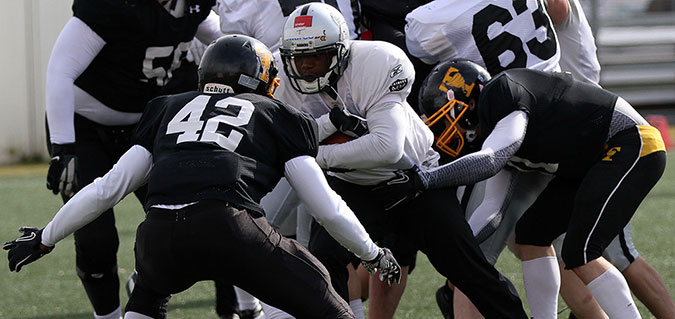The addition of a third Wild Card team in each conference and the subsequent expansion of the playoffs has resulted in a Super Wild Card Weekend of NFL action. For the first time ever, there will be three games on Saturday and three games on Sunday to be played at 1:05 PM, 4:40 PM and 8:15 PM ET on each day.
On Saturday, the Indianapolis Colts play at the Buffalo Bills (CBS, CBS All Access, 1:05 PM ET), the Seattle Seahawks host the Los Angeles Rams (FOX, FOX Deportes, 4:40 PM ET) and the Tampa Bay Buccaneers visit Washington (NBC, Universo, 8:15 PM ET).
Super Wild Card Weekend continues Sunday as the Baltimore Ravens visit the Tennessee Titans (ESPN, ABC, ESPN2, ESPN+, ESPN Deportes, Freeform, 1:05 PM ET). The New Orleans Saints welcome the Chicago Bears (CBS, Nickelodeon, Amazon Prime Video, CBS All Access, 4:40 PM ET). The Cleveland Browns travel to face the Pittsburgh Steelers (NBC, Telemundo, Peacock, 8:15 PM ET).
TURNAROUND TEAMS & CONSISTENT WINNERS HIGHLIGHT PLAYOFF FIELD
Six playoff teams – the KANSAS CITY CHIEFS (14-2), BUFFALO BILLS (13-3), GREEN BAY PACKERS (13-3), PITTSBURGH STEELERS (12-4), NEW ORLEANS SAINTS (12-4) and SEATTLE SEAHAWKS (12-4) – each won at least 12 regular-season games in 2020, tied with 2003, 2011 and 2019 for the most such teams in a single postseason in NFL history.
Each of the seven playoff teams from the AFC – KANSAS CITY (14-2), BUFFALO (13-3), PITTSBURGH (12-4), TENNESSEE (11-5), BALTIMORE (11-5), CLEVELAND (11-5) and INDIANAPOLIS (11-5) – had 11-or-more wins, marking the second time since 1970 that all playoff teams from one conference each had at least 11 wins. The only other occasion was the AFC in 1980, when all five teams had 11-or-more wins.
There are seven new playoff teams in 2020:
CHICAGO, CLEVELAND, INDIANAPOLIS, LOS ANGELES RAMS, PITTSBURGH, TAMPA BAY and WASHINGTON.
Since 1990 – a streak of 31 consecutive seasons – at least four teams have qualified for the playoffs in every season that were not in the postseason the year before.
The teams since 1990 to make the playoffs a season after failing to qualify:
SEASON |
PLAYOFF TEAMS NOT IN PREVIOUS SEASON’S PLAYOFFS |
| 1990 | 7 (Cincinnati, Chicago, Kansas City, Los Angeles Raiders, Miami, New Orleans, Washington) |
| 1991 | 5 (Atlanta, Dallas, Denver, Detroit, New York Jets) |
| 1992 | 6 (Miami, Minnesota, Philadelphia, Pittsburgh, San Diego Chargers, San Francisco) |
| 1993 | 5 (Denver, Detroit, Green Bay, Los Angeles Raiders, New York Giants) |
| 1994 | 5 (Chicago, Cleveland, Miami, New England, San Diego Chargers) |
| 1995 | 4 (Atlanta, Buffalo, Indianapolis, Philadelphia) |
| 1996 | 5 (Carolina, Denver, Jacksonville, Minnesota, New England) |
| 1997 | 5 (Detroit, Kansas City, Miami, New York Giants, Tampa Bay) |
| 1998 | 5 (Arizona, Atlanta, Buffalo, Dallas, New York Jets) |
| 1999 | 7 (Detroit, Indianapolis, St. Louis Rams, Seattle, Tampa Bay, Tennessee, Washington) |
| 2000 | 6 (Baltimore, Denver, New Orleans, New York Giants, Oakland Raiders, Philadelphia) |
| 2001 | 6 (Chicago, Green Bay, New England, New York Jets, Pittsburgh, San Francisco) |
| 2002 | 5 (Atlanta, Cleveland, Indianapolis, New York Giants, Tennessee) |
| 2003 | 8 (Baltimore, Carolina, Dallas, Denver, Kansas City, New England, St. Louis Rams, Seattle) |
| 2004 | 5 (Atlanta, Minnesota, New York Jets, Pittsburgh, San Diego Chargers) |
| 2005 | 7 (Carolina, Chicago, Cincinnati, Jacksonville, New York Giants, Tampa Bay, Washington) |
| 2006 | 7 (Baltimore, Dallas, Kansas City, New Orleans, New York Jets, Philadelphia, San Diego Chargers) |
| 2007 | 6 (Green Bay, Jacksonville, Pittsburgh, Tampa Bay, Tennessee, Washington) |
| 2008 | 7 (Arizona, Atlanta, Baltimore, Carolina, Miami, Minnesota, Philadelphia) |
| 2009 | 6 (Cincinnati, Dallas, Green Bay, New England, New Orleans, New York Jets) |
| 2010 | 5 (Atlanta, Chicago, Kansas City, Pittsburgh, Seattle) |
| 2011 | 6 (Cincinnati, Denver, Detroit, Houston, New York Giants, San Francisco) |
| 2012 | 4 (Indianapolis, Minnesota, Seattle, Washington) |
| 2013 | 5 (Carolina, Kansas City, New Orleans, Philadelphia, San Diego Chargers) |
| 2014 | 5 (Arizona, Baltimore, Dallas, Detroit, Pittsburgh) |
| 2015 | 4 (Houston, Kansas City, Minnesota, Washington) |
| 2016 | 6 (Atlanta, Dallas, Detroit, Miami, New York Giants, Oakland Raiders) |
| 2017 | 8 (Buffalo, Carolina, Jacksonville, Los Angeles Rams, Minnesota, New Orleans, Philadelphia, Tennessee) |
| 2018 | 7 (Baltimore, Chicago, Dallas, Houston, Indianapolis, Los Angeles Chargers, Seattle) |
| 2019 | 5 (Buffalo, Green Bay, Minnesota, San Francisco, Tennessee) |
| 2020 | 7 (Chicago, Cleveland, Indianapolis, Los Angeles Rams, Pittsburgh, Tampa Bay, Washington) |
Two teams won division titles – Pittsburgh (AFC North) and Washington (NFC East) – after missing the playoffs last season. At least two teams have won their divisions the season after missing the playoffs in 17 of the past 18 years.
Washington completed the “worst-to-first” turnaround, winning the NFC East the season after finishing in last place. At least one team has won its division the season after finishing in or tied for last place in 16 of the past 18 seasons.
The divisions with new champions in 2020:
| AFC EAST | AFC NORTH | AFC SOUTH | NFC EAST | NFC WEST | |
| 2020 | Buffalo | Pittsburgh | Tennessee | Washington | Seattle |
| 2019 | New England | Baltimore | Houston | Philadelphia | San Francisco |
In the 19 seasons since realignment in 2002, 30 of the 32 NFL teams have won a division title at least once, including the Buffalo Bills, who this season won their first AFC East division title since 1995.
How the 2020 playoff teams have fared in the 19 seasons since realignment in 2002 (2020 division winners in bold/italics):
TEAM |
DIVISION TITLES |
PLAYOFF BERTHS |
| Green Bay | 11 | 14 |
| Indianapolis | 9 | 14 |
| Seattle | 9 | 14 |
| Pittsburgh | 9 | 12 |
| Kansas City | 7 | 10 |
| New Orleans | 7 | 9 |
| Baltimore | 6 | 11 |
| Chicago | 4 | 5 |
| Tennessee | 3 | 7 |
| L.A. Rams | 3 | 5 |
| Washington | 3 | 5 |
| Tampa Bay | 3 | 4 |
| Buffalo | 1 | 3 |
| Cleveland | 0 | 2 |
Nine of this season’s 14 playoff teams have won at least one Super Bowl since 1999, capturing 11 of the past 21 Vince Lombardi Trophies. Those teams are the Ravens (XXXV, XLVII), Steelers (XL, XLIII), Packers (XLV), Colts (XLI), Chiefs (LIV), Rams (XXXIV), Buccaneers (XXXVII), Saints (XLIV) and Seahawks (XLVIII).
SUPER BOWL |
SEASON |
WINNER |
| XXXIV | 1999 | St. Louis Rams* |
| XXXV | 2000 | Baltimore Ravens* |
| XXXVI | 2001 | New England Patriots |
| XXXVII | 2002 | Tampa Bay Buccaneers* |
| XXXVIII | 2003 | New England Patriots |
| XXXIX | 2004 | New England Patriots |
| XL | 2005 | Pittsburgh Steelers* |
| XLI | 2006 | Indianapolis Colts* |
| XLII | 2007 | New York Giants |
| XLIII | 2008 | Pittsburgh Steelers* |
| XLIV | 2009 | New Orleans Saints* |
| XLV | 2010 | Green Bay Packers* |
| XLVI | 2011 | New York Giants |
| XLVII | 2012 | Baltimore Ravens* |
| XLVIII | 2013 | Seattle Seahawks* |
| XLIX | 2014 | New England Patriots |
| 50 | 2015 | Denver Broncos |
| LI | 2016 | New England Patriots |
| LII | 2017 | Philadelphia Eagles |
| LIII | 2018 | New England Patriots |
| LIV | 2019 | Kansas City Chiefs* |
| *In 2020 postseason | ||
The Green Bay Packers (.603) and Baltimore Ravens (.600) have the third- and fourth-highest postseason winning percentages in NFL history while the Pittsburgh Steelers have the second-most postseason wins (36) in league annals.
The 14 playoff teams and their postseason records:
TEAM |
WINS |
LOSSES |
PCT. |
| Green Bay Packers | 35 | 23 | .603 |
| Baltimore Ravens | 15 | 10 | .600 |
| Pittsburgh Steelers | 36 | 25 | .590 |
| Washington Football Team | 23 | 19 | .548 |
| Seattle Seahawks | 17 | 17 | .500 |
| Indianapolis Colts | 23 | 24 | .489 |
| Chicago Bears | 17 | 19 | .472 |
| Buffalo Bills | 14 | 17 | .452 |
| Tennessee Titans | 17 | 21 | .447 |
| Los Angeles Rams | 21 | 26 | .447 |
| New Orleans Saints | 9 | 12 | .429 |
| Kansas City Chiefs | 13 | 19 | .406 |
| Tampa Bay Buccaneers | 6 | 9 | .400 |
| Cleveland Browns | 11 | 20 | .355 |
YOUTH & CONSISTENCY HIGHLIGHT THE PLAYOFF QUARTERBACKS
The 2020 postseason is filled with young stars on the rise and veterans at the top of their game at the quarterback position.
Six quarterbacks under the age of 27 led their clubs to the postseason in 2020:
- Kansas City quarterback PATRICK MAHOMES ranked second the NFL with 4,740 passing yards and ranked fourth with 38 touchdown passes to help the Chiefs earn their third consecutive AFC West Division title. In five career postseason starts, he has 1,474 passing yards (294.8 per game) with 16 touchdowns (13 passing, three rushing) against two interceptions for a 107.1 rating. Last season, Mahomes became the youngest quarterback to win Super Bowl MVP honors as Kansas City earned the Super Bowl LIV title.
- Buffalo quarterback JOSH ALLEN set franchise records in passing yards (4,544) and touchdown passes (37) in 2020 as the Bills earned their first division title since 1995. Allen had 372 total yards (264 passing, 92 rushing, 16 receiving) in his first postseason appearance during the 2019 Wild Card round.
- Los Angeles Rams quarterback JARED GOFF passed for 3,952 yards and 20 touchdowns as the Rams clinched a playoff berth for the second time in the past three seasons. Goff is expected to make his fifth career postseason start, including a start in Super Bowl LIII following the 2018 season.
- Baltimore quarterback LAMAR JACKSON totaled 33 touchdowns (26 passing, seven rushing) and had 1,005 rushing yards in 2020, becoming the first quarterback in NFL history with at least 1,000 rushing yards in multiple seasons. Jackson will be making his third career postseason start after leading the Ravens to the postseason for the third consecutive season.
- Cleveland quarterback BAKER MAYFIELD, making his playoff debut, had 26 touchdown passes and a career-high 95.9 rating as the Browns earned their first playoff berth since 2002. Mayfield is one of three quarterbacks (ANDREW LUCK and PEYTON MANNING) to record at least 3,500 passing yards and 20 touchdown passes in each of his first three career seasons.
Chicago quarterback MITCHELL TRUBISKY will be making his second career postseason start as the Bears earned a playoff berth for the second time in the past three seasons (2018). Trubisky passed for 303 yards with one touchdown in his first career playoff start during the 2018 Wild Card round.
Five of the 15 quarterbacks who have started at least 15 postseason games in NFL history are active in the 2020 postseason and have each earned at least one Super Bowl championship:
- Tampa Bay quarterback TOM BRADY, who won six Super Bowl titles with New England, helped the Buccaneers earn their first playoff berth since 2007 and is the postseason’s all-time leader in games played (41), passing yards (11,388) and touchdown passes (73).
- Pittsburgh quarterback BEN ROETHLISBERGER, a veteran of 17 NFL seasons, will make his 22nd career postseason start to surpass Pro Football Hall of Famer JOHN ELWAY (21 starts) for the fifth-most in NFL history. Roethlisberger led the Steelers to Super Bowl titles in 2005 (XL) and 2008 (XLIII).
- Green Bay quarterback AARON RODGERS, a 16-year NFL veteran, will make his 19th career playoff start and tied Pro Football Hall of Famer TERRY BRADSHAW (19 starts) for the seventh-most career postseason starts among quarterbacks in NFL history. Rodgers led the NFL with 48 touchdown passes and a passer rating of 121.5 this season, the second-highest single-season passer rating in league annals. Rodgers led the Packers to a Super Bowl XLV championship in 2010.
- New Orleans quarterback DREW BREES, a veteran of 20 NFL seasons, will make his 17th career postseason start, tied with Pro Football Hall of Famers JIM KELLY (17 starts) and ROGER STAUBACH (17) for the 10th-most in league history. Brees led the Saints to the Super Bowl XLIV championship in 2009.
- Seattle quarterback RUSSELL WILSON, who has led Seattle to the playoffs in eight of his nine seasons, will make his 16th career postseason start. Wilson led Seattle to a Super Bowl XLVIII championship in 2013.
Three additional veteran quarterbacks are appearing in the postseason:
- Tennessee quarterback RYAN TANNEHILL set career highs in passing touchdowns (33) and rushing touchdowns (seven) as the Titans earned their first division title since 2008. Tannehill will be making his fourth career playoff start after helping the Titans reach the AFC Championship game last season.
- In his first season with Indianapolis, quarterback PHILIP RIVERS registered his eighth consecutive season with at least 4,000 passing yards (4,169) as the Colts clinched a playoff berth for the second time in the past three seasons (2018). Rivers will make his 12th career playoff start.
- Washington quarterback ALEX SMITH won his last five starts of the season as the Washington Football Team clinched its first division title since 2015. In seven career postseason starts, Smith has 15 touchdowns (14 passing, one rushing) against two interceptions for a 97.4 rating.
BEST NFL PLAYOFF PERFORMANCES
(Single postseason)
PASSING YARDS |
||||||
PLAYER, TEAM |
SEASON |
COMP. |
ATT. |
YARDS |
TD |
INT |
| Eli Manning, New York Giants |
2011 |
106 |
163 |
1,219 |
9 |
1 |
| Kurt WarnerHOF, Arizona |
2008 |
92 |
135 |
1,147 |
11 |
3 |
| Joe Flacco, Baltimore |
2012 |
73 |
126 |
1,140 |
11 |
0 |
| Tom Brady, New England |
2016 |
93 |
142 |
1,137 |
7 |
3 |
| Tom Brady, New England |
2017 |
89 |
139 |
1,132 |
8 |
0 |
RUSHING YARDS |
|||||
PLAYER, TEAM |
SEASON |
ATT. |
YARDS |
TD |
|
| John RigginsHOF, Washington |
1982 |
136 |
610 |
4 |
|
| Terrell DavisHOF, Denver |
1997 |
112 |
581 |
8 |
|
| Terrell DavisHOF, Denver |
1998 |
78 |
468 |
3 |
|
| Marcus AllenHOF, Los Angeles Raiders |
1983 |
58 |
466 |
4 |
|
| Eddie George, Tennessee |
1999 |
108 |
449 |
3 |
|
RECEIVING YARDS |
|||||
PLAYER, TEAM |
SEASON |
REC. |
YARDS |
TD |
|
| Larry Fitzgerald, Arizona |
2008 |
30 |
546 |
7 |
|
| Hakeem Nicks, New York Giants |
2011 |
28 |
444 |
4 |
|
| Jerry RiceHOF, San Francisco |
1988 |
21 |
409 |
6 |
|
| Steve Smith, Sr., Carolina |
2003 |
18 |
404 |
3 |
|
| Charlie Brown, Washington |
1983 |
14 |
401 |
1 |
|
RECEPTIONS |
|||||
PLAYER, TEAM |
SEASON |
REC. |
YARDS |
TD |
|
| Larry Fitzgerald, Arizona |
2008 |
30 |
546 |
7 |
|
| Hakeem Nicks, New York Giants |
2011 |
28 |
444 |
4 |
|
| Demaryius Thomas, Denver |
2013 |
28 |
306 |
3 |
|
| Steve Smith, Sr., Carolina |
2005 |
27 |
335 |
3 |
|
| Wes Welker, New England |
2007 |
27 |
213 |
2 |
|
SCRIMMAGE TOUCHDOWNS |
|||||
PLAYER, TEAM |
SEASON |
TOTAL TD |
RUSH TD |
REC. TD |
|
| Terrell DavisHOF, Denver |
1997 |
8 |
8 |
0 |
|
| Larry Fitzgerald, Arizona |
2008 |
7 |
0 |
7 |
|
| Larry CsonkaHOF, Miami |
1973 |
6 |
6 |
0 |
|
| Franco HarrisHOF, Pittsburgh |
1974 |
6 |
6 |
0 |
|
| Sony Michel, New England |
2018 |
6 |
6 |
0 |
|
| John RigginsHOF, Washington |
1983 |
6 |
6 |
0 |
|
| Jerry RiceHOF, San Francisco |
1988 |
6 |
0 |
6 |
|
| Gerald Riggs, Washington |
1991 |
6 |
6 |
0 |
|
| Emmitt SmithHOF, Dallas |
1995 |
6 |
6 |
0 |
|
| Ricky Watters, San Francisco |
1993 |
6 |
6 |
0 |
|
| Damien Williams, Kansas City |
2019 |
6 |
4 |
2 |
|




















